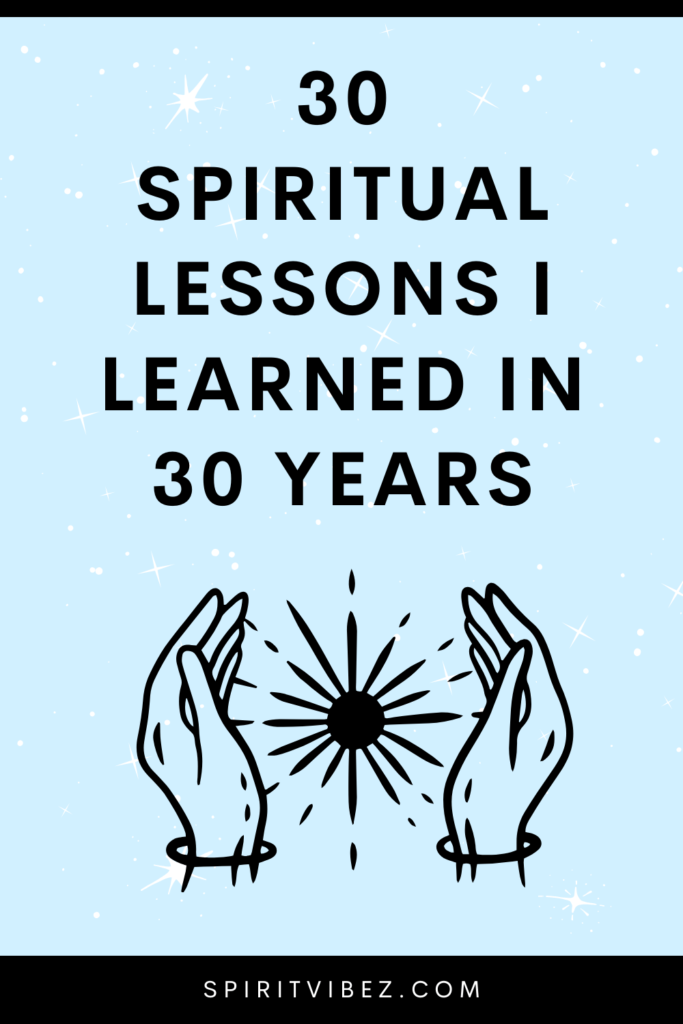Last Updated on October 17, 2024

Turning 30 is a significant milestone in anyone’s life, it’s a time of reflection, growth, and anticipation for what lies ahead.
As I approached this landmark birthday, I found myself looking back on the past three decades with a sense of wonder and gratitude.
The journey has been filled with incredible highs, challenging lows, and countless lessons that have shaped who I am today.
In this blog post, I want to share with you 30 spiritual lessons I’ve learned in 30 years.
These insights have been my guiding light, helping me navigate the complexities of life with more grace, wisdom, and peace.
From understanding the power of words and the importance of self-love to recognizing the interconnectedness of all things, these lessons have profoundly influenced my perspective and personal growth.
These are my truths, born from my unique experiences and reflections, you might not resonate with all of them, and that’s perfectly okay.
We each walk our own path and discover our own lessons along the way.
Whether you’re approaching your own milestone birthday, embarking on a journey of self-discovery, or simply looking for some inspiration, I hope these lessons offer you something valuable.
30 Spiritual Lessons I Learned
Here are the 30 spiritual lessons I’ve learned before turning 30:
1. Never speak badly about yourself, because you are always listening
Our inner dialogue significantly influences our reality.
When we speak negatively about ourselves, we internalize those words, affecting our self-esteem and overall well-being.
Words carry energy and power, functioning like spells that shape our perceptions and experiences.
Positive affirmations and self-compassion can transform our internal landscape, leading to greater confidence, resilience, and happiness.
For example, instead of saying, “I’m not good enough,” reframe it as “I am capable and worthy.”
This shift not only changes how we feel about ourselves but also influences how we engage with the world, attracting more positive experiences.
Check out these daily positive affirmations:
- 35 affirmations to raise your vibration
- 30 affirmations for your inner goddess
- 30 affirmations for inner child healing
- 24 affirmations for manifestation
- 30 affirmations for self-love & confidence
2. Patterns will repeat themselves until you’ve learned the lesson
Life tends to present us with similar challenges until we gain the necessary insight.
Recognizing and breaking these patterns requires self-awareness and reflection.
For instance, if you find yourself repeatedly in toxic relationships, it’s a signal to examine your beliefs about love and self-worth.
By understanding the root cause and making conscious changes, you can break free from these cycles and create healthier, more fulfilling experiences.
This process often involves healing old wounds, shifting limiting beliefs, and adopting new, empowering behaviors.
3. We chose our lives
The concept that we chose our lives before birth suggests that our souls selected specific challenges and experiences to learn and grow.
This perspective can be empowering, helping us see difficulties not as random misfortunes but as purposeful opportunities for growth.
It encourages us to take responsibility for our lives, fostering a proactive rather than victimized mindset.
By embracing this belief, we can find meaning in our struggles, use them as catalysts for personal development, and approach life with a sense of purpose and determination.
4. Everything happens for a reason
Believing that everything happens for a reason can provide comfort and a sense of order amidst chaos.
This mindset encourages us to seek lessons and growth opportunities in every situation.
When faced with adversity, instead of feeling defeated, we can ask ourselves, “What can I learn from this?”
This approach fosters resilience and a positive outlook, helping us navigate life’s challenges with grace.
It reminds us that even the most painful experiences can lead to personal evolution and unexpected blessings.
5. What comes up must come down
Life is full of highs and lows.
Embracing this cyclical nature helps us stay grounded during good times and hopeful during challenging periods, knowing that change is constant.
6. The universe has your back
Trusting that the universe supports and guides you can alleviate fear and anxiety.
This belief allows you to surrender control and flow with life’s natural rhythms, knowing that you are being led toward your highest good.
Practicing gratitude, mindfulness, and meditation can strengthen this trust, helping you stay centered and grounded.
By maintaining a positive mindset and looking for signs of support and guidance, you can develop a deep sense of security and peace, even in uncertain times.
7. Relearn the truth
Our understanding of truth evolves as we grow.
Relearning the truth involves being open to new information and perspectives, questioning our beliefs, and letting go of outdated ideas.
This continuous process of self-discovery helps us stay aligned with our authentic selves and adapt to life’s changes.
For example, a belief you held in your teens might not serve you in adulthood.
By reassessing and updating your beliefs, you can live a more authentic and fulfilling life, free from the constraints of outdated paradigms.
8. Let go of what no longer serves you
Holding onto outdated beliefs, toxic relationships, or unproductive habits can hinder your growth.
Learning to release what no longer serves your highest good creates space for new, positive experiences and opportunities.
9. Gratitude is a powerful practice
Regularly expressing gratitude can transform your perspective and elevate your mood.
It shifts your focus from what you lack to what you have, fostering a sense of abundance and attracting more positive experiences into your life.
10. Trust your intuition
Your intuition is a powerful inner guidance system.
Learning to trust and follow your gut feelings can lead you to make wiser decisions and navigate life’s uncertainties with greater confidence.
11. Change is the only constant
Embracing change as a natural part of life helps you adapt and grow.
It encourages flexibility and resilience, allowing you to flow with life’s inevitable ups and downs rather than resisting them.
12. What you believe is what will come true
When we deeply believe in something—whether it’s positive or negative—we create the conditions for it to manifest in our lives.
Our thoughts, emotions, and energy align with what we expect, and we begin to make decisions and attract situations that match those beliefs.
When you cultivate positive beliefs about yourself, your future, and the world, you open yourself up to opportunities and experiences that reflect those beliefs.
On the flip side, if you carry limiting beliefs or fear-based thoughts, you may unintentionally invite challenges or obstacles that reinforce those patterns.
Manifestation isn’t about wishful thinking, it’s about aligning your inner beliefs with your actions, choices, and energy.
When your inner world is aligned with what you want to see in your outer world, the universe has a way of responding to that alignment.
13. Food is medicine
What we eat significantly impacts our physical, emotional, and spiritual health.
Consuming plant-based whole foods can boost our energy, enhance our mood, and promote overall well-being.
Mindful eating practices, such as savoring each bite and listening to your body’s hunger cues, can deepen your connection with food and your body.
Viewing food as medicine encourages us to make conscious, healthy choices that support our long-term health and vitality.
It also involves being aware of how different foods affect your energy and emotions, helping you create a balanced and nourishing diet.
14. Get comfortable being alone
Solitude provides a valuable opportunity for self-reflection, personal growth, and inner peace.
Embracing alone time allows you to reconnect with your inner self, gain clarity on your values and goals, and cultivate a sense of independence.
Practices like meditation, journaling, and spending time in nature can enhance your comfort with solitude and deepen your self-awareness.
By becoming comfortable being alone, you can develop a strong, self-reliant foundation that enhances your relationships and overall quality of life.
15. Compassion is the fountain of forgiveness
Compassion, both for yourself and others, is essential for forgiveness.
Understanding that everyone is on their own unique journey and facing their own struggles can help dissolve anger and resentment.
Compassionate forgiveness frees you from the burden of negative emotions and promotes emotional healing.
It involves recognizing your own humanity and imperfections, allowing you to extend the same understanding and empathy to others.
By practicing compassion, you can cultivate a more loving and forgiving heart, leading to inner peace and harmonious relationships.
16. Spirit guides are always there to help you, just ask
Spirit guides can offer guidance and support.
By asking for their help and being open to their messages, you can receive valuable insights and assistance.
Practices like meditation, prayer, and journaling can help you connect with your spirit guides and attune to their guidance.
Trusting in their presence and seeking their wisdom can provide comfort, clarity, and direction, especially during challenging times.
17. Everything is energy
Understanding that everything in the universe, including our thoughts and emotions, is made up of energy can transform how we approach life.
By managing our energy through practices like meditation, mindfulness, and positive thinking, we can create a more balanced and harmonious existence.
This awareness encourages us to be mindful of the energy we emit and surround ourselves with, fostering a life filled with positive, uplifting experiences.
It also emphasizes the importance of maintaining energetic hygiene, such as clearing negative energy and cultivating a high vibrational state through gratitude and joy.
18. Live in the present moment
Focusing on the present moment enhances mindfulness and reduces stress.
It allows you to fully experience life as it happens, fostering a deeper appreciation for everyday moments and helping you avoid being overwhelmed by past regrets or future anxieties.
19. Self-acceptance is key
Accepting yourself as you are, with all your flaws and imperfections, is crucial for inner peace and happiness.
Self-acceptance fosters healthy self-esteem and allows you to live authentically without constantly seeking external validation.
20. Everyone has a different truth
Recognizing that everyone’s perspective is shaped by their unique experiences fosters empathy and tolerance.
It reminds us to honor others’ journeys and beliefs, even when they differ from our own.
This understanding can enhance our relationships and create a more compassionate and inclusive world.
By embracing diversity in thought and experience, we can learn from each other and grow collectively, fostering a sense of unity and mutual respect.
21. Self-love is making healthy choices for yourself
Self-love involves nurturing our bodies with healthy food, exercise, and adequate rest.
Being mindful of what we consume physically, emotionally, and mentally is a profound act of self-care.
This includes not only our diet but also the media we consume and the people we surround ourselves with.
By making conscious, healthy choices, we honor our bodies and minds, creating a foundation for overall well-being and happiness.
It also involves setting boundaries and prioritizing activities that nourish and uplift us, reinforcing our commitment to self-care and self-respect.
22. Self-discipline is necessary for success
Self-discipline is crucial for achieving personal and spiritual growth.
It helps us stay committed to our goals, maintain healthy habits, and overcome challenges.
Practices like setting clear intentions, creating routines, and holding ourselves accountable can strengthen our self-discipline and lead to a more fulfilling life.
This principle emphasizes the importance of consistency and perseverance in manifesting our desires and living in alignment with our values.
By cultivating self-discipline, we can create a life of purpose and intentionality, achieving our highest potential.
23. Love is the highest vibration
Love is the most powerful force in the universe.
Operating from a place of love rather than fear can transform your relationships, enhance your well-being, and create a ripple effect of positivity in the world.
24. Forgiveness is for you
Forgiving others frees us from the burden of resentment and anger.
It’s a gift we give ourselves to heal and move forward, creating space for peace and happiness.
Forgiveness does not condone harmful behavior but rather releases us from its emotional grip.
By practicing forgiveness, we reclaim our power and open our hearts to greater love and compassion.
This process often involves acknowledging and processing our emotions, setting healthy boundaries, and letting go of past hurts, allowing us to move forward with a lighter, more open heart.
25. Your vibration attracts alike
The energy we emit attracts similar energies.
By maintaining a high vibration through positive thoughts, gratitude, and joy, we attract positive experiences and people into our lives.
This principle underscores the importance of cultivating a positive mindset and emotional state, as our inner world reflects our outer reality.
Practices like gratitude journaling, affirmations, and surrounding ourselves with positive influences can help elevate our vibration, creating a life filled with harmony and abundance.
26. We are all connected
Recognizing our interconnectedness fosters a sense of unity and compassion.
It reminds us that our actions impact others and the world, encouraging us to act with kindness and responsibility.
This awareness can inspire us to contribute positively to our communities and the planet, promoting a sense of collective well-being.
By embracing our shared humanity, we can create a more compassionate, just, and sustainable world, recognizing that we are all part of a larger whole.
27. How people treat you has nothing to do with you but all about how they treat themselves
People’s behavior towards us often reflects their inner state.
Understanding this can help us not take things personally and respond with compassion rather than defensiveness.
28. Don’t make assumptions
Assumptions can lead to misunderstandings and unnecessary conflict.
Communicating openly and seeking clarity helps build healthier relationships and reduces miscommunication.
29. Healing is an everyday process
Healing isn’t something that happens overnight or in a single moment of epiphany.
It’s a continuous journey, one that requires attention, patience, and self-compassion every day.
Whether we’re healing from emotional wounds, physical challenges, or spiritual struggles, we must recognize that progress often comes in small, gradual steps.
Some days will feel easier than others, but every moment of self-care, every decision to forgive, and every acknowledgment of your own pain is a step forward.
Embrace the process, knowing that it’s okay to take your time.
Healing isn’t linear, and that’s what makes it transformative.
30. Never stop learning
Life is a teacher, and every experience, whether joyful or painful, offers a lesson.
Our spiritual journey deepens when we stay open to learning, no matter where we are in life.
There’s always something new to discover about ourselves, others, and the universe.
Challenges and setbacks often provide the most profound insights, but even in the mundane, there are opportunities for growth.
By nurturing curiosity and humility, we remain students of life, constantly evolving.
Remember that the path of learning doesn’t end—it’s an infinite road that keeps us connected to the divine wisdom around us.
If you enjoyed this article with 30 spiritual lessons I learned in 30 years, I would be grateful if you shared it on Twitter, Facebook, or Pinterest! Thank you❤️
📌 PIN THIS POST FOR LATER


Hello, my name is Sara and I am the founder of Spiritvibez, I’m here to guide you on your spiritual journey toward healing, growth, and self-discovery. I believe that true transformation occurs when the mind, body, and spirit are aligned and working in harmony. Through Spiritvibez, I hope to inspire and empower you to deepen your spiritual practice, embrace your authentic self, and begin living your best life.
